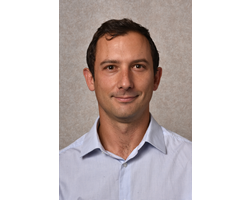“Novel NRAS isoform mediates BRAF inhibitor resistance in papillary thyroid cancer- thinking outside of the box to overcome “inevitable” treatment failure”
Dr. Ann-Kathrin Eisfeld has wanted to be a doctor for as long as she can remember, since growing up in Northern Germany and watching her father practice medicine. However, she did not discover her passion for research until she was attending medical school at the University of Leipzig, Germany and realized the power translational genetics has on cancer treatment. Dr. Eisfeld quickly began research projects that eventually led to a hematology residency/fellowship in Leipzig. Her passion for genetics was the reason she chose to pause her fellowship in 2009 to take a research position in Albert de la Chapelle’s Lab at OSU. She continued to pursue translation leukemia projects, but, together with Dr. de la Chapelle, she also undertook studies focused on genetics in solid tumors for which she assumed a senior role. She is extremely happy in the lab, but she is also a medical doctor and needs to treat patients. Thus, in 2016 she resumed her clinical fellowship, but stayed at OSU so she could maintain a research lab. The support from ATA will help her continue independent projects while finishing her clinical training, so she can finally “reunite” her two passions -research and patient care- as a Physician Scientist.
Press Release
“Deiodinase 3: A Thyroid Hormone Associated Renoprotective Protein”
Dr. Nicholas Tardi is a uniquely trained and recently promoted instructor at Rush University Medical Center, who is prepared to conduct quality, novel, and significant research in the fields of nephrology and endocrinology to become a successful independent investigator. He earned his Ph.D. in Molecular and Cellular Biology from Illinois State University in 2013 where he developed expertise in cell signaling, molecular mechanisms of disease, protein biology, and analytical processing to answer questions about cellular regulation of growth control pathways. Since joining Rush, he has been investigating the molecular mechanisms of thyroid hormone imbalance in kidney disease, and characterizing pharmacologically active agents to rescue kidney disease in mice. Recently, he has worked closely with two mentors in Drs. Jochen Reiser and Antonio Bianco to develop a niche to study kidney and thyroid comorbidity. Dr. Tardi’s prior experience, both clinically and in a research capacity, has guided his research focus to thyroid hormone regulation via deiodinases in normal renal function and pathogenesis. His passion for research, scientific expertise, and inimitable technical perspective is reflected in publications in Nature Medicine, Science, Cell and Genetics.
Press Release
“T regulatory cells in thyroid antibody positive pregnant women”
Dr. Behringer-Massera completed her medical studies at the University of Heidelberg in Germany, where she graduated in December 2009. She continued her medical training as a resident in Internal Medicine at the St. Josef Hospital in Heidelberg. She applied for a residency in Internal Medicine in the United States and was accepted in 2011 at Montefiore Medical Center, Bronx, New York. Dr. Behringer-Massera successfully completed her Internal Medicine training in 2014 and was awarded a research fellowship (ECRIP – empire clinical research investigator program) at the Albert Einstein College of Medicine, where she joined a multi-center clinical trial (GRADE – glycemia reduction approaches in diabetes) funded by the NIH. During this time she also conducted a qualitative study on barriers to enrollment into research studies. In 2016 she started training as a Clinical Fellow in Endocrinology at the Mount Sinai Hospital in New York. Subsequently, Dr. Behringer-Massera has accepted a position as Assistant Professor at the Icahn School of Medicine at Mount Sinai with clinical duties at Mount Sinai Beth Israel Medical Center which she will assume after completion of her fellowship in June 2018.
Press Release
“De novo triiodothyronine (T3) formation in T3 toxicosis of Graves´ Disease (GD)”
Dr. Cintia E. Citterio’s interest in thyroid function and disease was initiated during her Ph.D. research under the direction of Dr. Héctor M. Targovnik at the University of Buenos Aires (UBA) and is disseminated in seventeen publications. Her background includes a double major from the UBA in Biochemistry and Pharmaceutical Sciences. In 2014, she was named Fulbright scholar to conduct postdoctoral studies in Dr. Peter Arvan’s lab at the University of Michigan where she developed a new assay to measure de novo triiodothyronine (T3) formation within thyroglobulin secreted from hyperstimulated thyrocytes (Citterio et al.,2017) and characterized the molecular mechanisms of T3 formation at the antepenultimate tyrosine residue of thyroglobulin (Citterio et al.,2018). She further discussed that work on her recent article published in Nature Reviews Endocrinology (Citterio et al., 2019). Dr. Citterio is currently an Assistant Professor at the INIGEM UBA-CONICET. Her ATA research project focuses in the identification of non-classical de novo T3-forming sites in thyroglobulin responsible for excess T3 production in patients with autoimmune hyperthyroidism of Graves´ disease. The long term objective is to dissect the molecular mechanisms that underlie de novo T3 synthesis in Graves’ Disease and in other thyroid conditions characterized by hyperactivated thyroid TSH-receptors and preferential T3 formation within thyroglobulin for reasons that have not yet been clarified. Press Release
“Co-opting tumor associated macrophages in anaplastic thyroid cancer to enhance immune checkpoint blockade response”
Miles Miller, PhD, is a principal investigator at the Massachusetts General Hospital Center for Systems Biology, and Assistant Professor of Radiology at Harvard Medical School. He serves as a faculty member of the Harvard Bioinformatics and Integrative Genomics PhD Program, and for the last 10 years he has developed new approaches and technologies for parsing mechanisms of drug action and cancer behavior in disease microenvironments from a quantitative network-level perspective. He has extensive training and publications in computational modeling, multivariate statistics, in vivo microscopy, nanotechnology, and cancer pharmacology. As an NIH-funded postdoctoral fellow, he developed new techniques for imaging the in vivo transport, cellular uptake, and pharmacodynamics of novel chemotherapeutic formulations at a single-cell level within live tumor models under the guidance of Prof. Ralph Weissleder. Within the MGH Center for Systems Biology he benefits from interdisciplinary resources and expertise related to in vivo microscopy and translational imaging. Dr. Miller received a Ph.D. from the Massachusetts Institute of Technology Department of Biological Engineering under the mentorship of Profs. Douglas Lauffenburger and Linda Griffith. He graduated summa cum laude from Princeton University.
Press Release
“Dual Inhibition of RET and Aurora B to Study the Simultaneous Regulation of Multiple Oncogene Pathways in Medullary Thyroid Cancer”
Dr. Brendan Frett received his Ph.D. in Pharmaceutical Sciences with an emphasis in Drug Discovery and Development from the University of Arizona in 2014. He received postdoctoral training in Medicinal Chemistry as well as Pharmaceutics at the University of Arizona. Dr. Frett has successfully transferred academic-based discoveries to pharmaceutical companies for clinical development, specializing in the development of therapies for orphan diseases. He is interested in pursuing translational research projects, where research completed in his laboratory can directly help patients. Specifically, Dr. Frett investigates resistance mechanisms and the design of next-generation precision medicine therapies for thyroid cancer. He is exploring the expanded use of precision medicine in metastatic medullary thyroid cancer (MTC), an aggressive form of thyroid cancer with a poorer prognosis than that of follicular or papillary. Due to the heterogeneous nature of MTC, Dr. Frett is interested in the tailoring of precision medicine to the unique pathology of MTC to generate ‘synergistic medicine’. Outside of research, Dr. Frett enjoys reading classical literature, horology, and spending time with his family.
Press Release
“Proteomic led discovery of essential genes in Medullary Thyroid Cancer”
Dr. Wayne Miles of the Ohio State University Comprehensive Cancer Center was award a 2018 thyroid cancer research grant for the project titled: “Proteomic led discovery of essential genes in Medullary Thyroid Cancer” by the American Thyroid Association. Dr. Miles completed his undergraduate education at Massey University in New Zealand before moving to the University of Manchester (UK) for his graduate training. He then completed his Post-Doctoral fellowship at the Massachusetts General Hospital Cancer Center and Harvard Medical School researching the mechanisms that enable cancer cells lacking the Retinoblastoma 1 (RB) tumor-suppressor gene to survive. He then moved to the Ohio State University Comprehensive Cancer Center in 2016. Dr. Miles’ research focuses on understanding how loss of the Retinoblastoma 1, RB, tumor-suppressor gene and its upstream regulators contribute to cancer growth. More recently, his research has expanded to investigate the roles of RB-inactivation in Medullary Thyroid Cancer, as this disease represents a unique place to study RB-regulation. This is because: (1) RB-inactivation caused by CDKN2C loss is the strongest prognostic marker of poor outcome for MTC patients and (2) RB1-/- mice develop aggressive MTC. Building on Dr. Miles’ proteomic profiling of MTC cells lines. In this project, the Miles lab will couple large scale omics profiling and CRISPR to determine; (1) the composition of the murine MTC tumor proteome and (2) which proteins are essential for human MTC cell line survival.
Press Release









